-
 Bitcoin
Bitcoin $87,160.3686
2.59% -
 Ethereum
Ethereum $1,577.5291
-0.58% -
 Tether USDt
Tether USDt $1.0000
0.00% -
 XRP
XRP $2.0804
0.22% -
 BNB
BNB $596.3334
0.99% -
 Solana
Solana $136.5658
-0.15% -
 USDC
USDC $1.0000
0.00% -
 Dogecoin
Dogecoin $0.1584
1.77% -
 TRON
TRON $0.2458
-0.32% -
 Cardano
Cardano $0.6208
0.05% -
 Chainlink
Chainlink $13.1006
-1.96% -
 UNUS SED LEO
UNUS SED LEO $9.1412
-1.97% -
 Avalanche
Avalanche $19.9880
2.50% -
 Stellar
Stellar $0.2528
3.56% -
 Shiba Inu
Shiba Inu $0.0...01238
-0.19% -
 Toncoin
Toncoin $2.8930
-3.79% -
 Sui
Sui $2.2031
4.44% -
 Hedera
Hedera $0.1692
1.25% -
 Bitcoin Cash
Bitcoin Cash $343.2002
2.28% -
 Polkadot
Polkadot $3.8296
-1.99% -
 Hyperliquid
Hyperliquid $17.9378
1.39% -
 Litecoin
Litecoin $78.0777
0.75% -
 Dai
Dai $0.9999
0.00% -
 Bitget Token
Bitget Token $4.4322
0.90% -
 Ethena USDe
Ethena USDe $0.9993
0.00% -
 Pi
Pi $0.6347
-0.88% -
 Monero
Monero $214.7110
-0.08% -
 Uniswap
Uniswap $5.2643
-0.22% -
 Pepe
Pepe $0.0...07787
2.99% -
 Aptos
Aptos $4.9970
-0.84%
What is the difference between Ethereum spot trading and Bitcoin spot trading?
Bitcoin and Ethereum spot trading differ in underlying asset (BTC vs ETH), market maturity & liquidity, technology (PoW vs PoS), use cases (store of value vs. dApps), and regulatory landscape, impacting price volatility and trading ease.
Feb 28, 2025 at 02:43 am
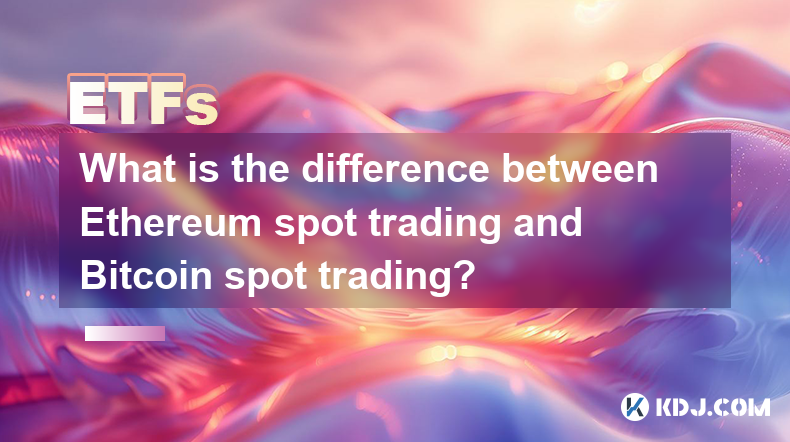
What is the difference between Ethereum spot trading and Bitcoin spot trading?
Key Points:
- Underlying Asset: The core difference lies in the underlying asset being traded: Bitcoin (BTC) versus Ethereum (ETH). This difference impacts everything from market capitalization and volatility to the use cases driving demand.
- Market Maturity and Liquidity: Bitcoin, being the older and more established cryptocurrency, generally boasts higher liquidity and trading volume than Ethereum. This impacts price stability and ease of trading.
- Technological Differences: While both operate on blockchain technology, their underlying functionalities and consensus mechanisms differ significantly. This impacts transaction fees, speed, and scalability, influencing the overall trading experience.
- Use Cases and Adoption: Bitcoin primarily functions as a store of value and a medium of exchange, while Ethereum has evolved into a platform for decentralized applications (dApps), smart contracts, and non-fungible tokens (NFTs). This difference significantly affects the price dynamics of each cryptocurrency.
- Regulatory Landscape: While both are subject to evolving regulatory scrutiny, the regulatory approaches might differ depending on jurisdiction and the specific use cases associated with each cryptocurrency.
Unordered List of Detailed Explanations:
- Underlying Asset: Bitcoin vs. Ethereum
Bitcoin and Ethereum, while both cryptocurrencies, represent vastly different technological underpinnings and market positions. Bitcoin, the first cryptocurrency, is often referred to as "digital gold" due to its scarcity (a maximum of 21 million coins) and its role as a store of value. Its primary function is as a decentralized, peer-to-peer digital currency, minimizing the need for intermediaries in transactions. Its blockchain is designed for simplicity and security, prioritizing transaction finality and immutability above all else. In contrast, Ethereum is a decentralized platform that enables smart contracts and decentralized applications (dApps). This means it's not just a currency; it's a programmable blockchain that allows developers to build and deploy a wide range of applications, including DeFi protocols, NFTs, and more. This versatility expands its use cases beyond simple transactions, leading to a different kind of market demand and price sensitivity. The inherent differences in their design philosophies – Bitcoin’s focus on simplicity and security versus Ethereum's focus on programmability and scalability – directly impact their respective spot markets and trading dynamics. The inherent differences in their design philosophies – Bitcoin’s focus on simplicity and security versus Ethereum's focus on programmability and scalability – directly impact their respective spot markets and trading dynamics. Understanding these fundamental distinctions is crucial for navigating the complexities of trading both assets. The vastly different use cases and the resulting demand from different market participants significantly impact the price action and volatility observed in each market. For instance, news related to DeFi development will likely impact ETH more than BTC, while news related to macroeconomic factors or regulatory changes might impact both but with varying degrees of influence.
- Market Maturity and Liquidity: A Comparison
Bitcoin, having been around longer, enjoys significantly greater market maturity and liquidity compared to Ethereum. This means there are more buyers and sellers in the Bitcoin spot market, leading to tighter spreads (the difference between the bid and ask prices) and a more efficient price discovery mechanism. Large orders can be executed with minimal impact on the price, unlike in less liquid markets where large trades can significantly move the price. This higher liquidity makes Bitcoin spot trading generally easier and less risky for traders, particularly those dealing with large volumes. Ethereum, while a major cryptocurrency, still has a smaller market capitalization and trading volume compared to Bitcoin. While Ethereum's liquidity has increased substantially over the years, it remains comparatively less liquid, making it potentially more susceptible to price volatility caused by relatively smaller trading volumes. This difference in liquidity can significantly affect trading strategies. High-frequency traders, for example, might prefer Bitcoin's higher liquidity for its faster execution speeds and lower slippage (the difference between the expected price and the actual execution price). Conversely, traders looking to capitalize on potential price swings might find Ethereum's volatility more attractive, despite the inherent risks associated with lower liquidity. This liquidity disparity also influences the availability of leverage and margin trading opportunities; typically, more established and liquid markets offer a broader range of leverage options.
- Technological Differences: Impact on Trading
The technological differences between Bitcoin and Ethereum's underlying blockchains have a direct impact on their respective spot trading experiences. Bitcoin uses a Proof-of-Work (PoW) consensus mechanism, which requires miners to solve complex mathematical problems to validate transactions and add new blocks to the blockchain. This process is energy-intensive but results in a highly secure and decentralized network. However, transaction confirmation times can be relatively slow, and transaction fees can fluctuate based on network congestion. Ethereum, on the other hand, initially used PoW but transitioned to a Proof-of-Stake (PoS) consensus mechanism, called the Beacon Chain. PoS is significantly more energy-efficient and allows for faster transaction processing. However, the transition to PoS has also introduced complexities and potential vulnerabilities that are still being evaluated by the community. These differences in consensus mechanisms translate directly to the trading experience. Traders need to be aware of potential delays in transaction confirmations and fluctuating transaction fees when trading Bitcoin, especially during periods of high network activity. Ethereum's transition to PoS has reduced transaction fees and improved transaction speeds, but the potential for network congestion still exists. Understanding these technological nuances is crucial for choosing appropriate trading strategies and managing risk effectively. For example, a trader might employ different order types (like limit orders versus market orders) based on the expected transaction speed and fees associated with each cryptocurrency.
- Use Cases and Adoption: Driving Market Dynamics
The differing use cases of Bitcoin and Ethereum are key drivers of their respective market dynamics. Bitcoin's primary function as a store of value and a medium of exchange has led to its adoption by institutional investors and individuals seeking a hedge against inflation or a safe haven asset. This relatively stable demand, though subject to market sentiment, contributes to Bitcoin's price stability relative to other cryptocurrencies. In contrast, Ethereum's role as a platform for decentralized applications (dApps), smart contracts, and NFTs has created a more dynamic and volatile market. The success or failure of dApps built on Ethereum directly impacts the demand for ETH, leading to significant price swings. The rapid growth of the NFT market, for example, has significantly influenced the price of ETH. Similarly, developments in the decentralized finance (DeFi) space, where ETH plays a crucial role, can cause significant price fluctuations. This difference in use cases highlights the importance of understanding the broader technological ecosystem surrounding each cryptocurrency. Traders need to stay informed about developments in DeFi, NFTs, and other sectors that influence Ethereum's value proposition. This necessitates a deeper understanding of the technological landscape and the potential implications of various technological advancements and market trends. This contrasts with Bitcoin, where market sentiment and macroeconomic factors often play a more dominant role in influencing price movements.
- Regulatory Landscape: Navigating the Legal Maze
Both Bitcoin and Ethereum are subject to evolving regulatory scrutiny worldwide. However, the specific regulatory approaches and the focus of regulatory efforts can differ depending on the jurisdiction and the perceived risks associated with each cryptocurrency. Bitcoin, being primarily viewed as a store of value and a medium of exchange, might face regulations related to anti-money laundering (AML) and know-your-customer (KYC) compliance, similar to traditional financial assets. Ethereum, given its broader use cases in DeFi and NFTs, might face additional regulatory challenges related to securities laws, consumer protection, and the regulation of decentralized autonomous organizations (DAOs). These regulatory uncertainties can create volatility in both markets, as changes in regulatory frameworks can significantly impact investor sentiment and trading activity. Traders need to be aware of the evolving regulatory landscape in their respective jurisdictions and adapt their trading strategies accordingly. This requires staying informed about regulatory developments and understanding how these developments might impact the price and availability of each cryptocurrency. Navigating the complex regulatory landscape is crucial for mitigating risks and ensuring compliance. The lack of a globally unified regulatory framework adds further complexity, requiring traders to carefully consider the legal implications of their trading activities in different regions.
FAQs:
Q: Which cryptocurrency is more volatile: Bitcoin or Ethereum?
A: Generally, Ethereum exhibits higher volatility than Bitcoin. This is largely due to Ethereum's broader use cases and its susceptibility to factors specific to the DeFi and NFT markets. Bitcoin, while subject to price swings, tends to be less volatile due to its established position as a store of value and its larger market capitalization.
Q: Is it easier to trade Bitcoin or Ethereum spot?
A: Bitcoin spot trading is generally considered easier due to its higher liquidity and greater market depth. However, both markets are accessible through various exchanges, and the ease of trading can also depend on the specific exchange and the trader's experience.
Q: What are the typical transaction fees for Bitcoin and Ethereum spot trades?
A: Transaction fees for both vary depending on network congestion and the specific exchange. Generally, Ethereum transaction fees have historically been higher than Bitcoin's, though the shift to PoS has significantly reduced Ethereum fees.
Q: Which cryptocurrency is better for long-term investment?
A: There is no definitive answer to this question, as both Bitcoin and Ethereum have the potential for long-term growth. The best choice depends on individual risk tolerance and investment strategy. Bitcoin is often favored for its established position and scarcity, while Ethereum's potential for growth within the DeFi and Web3 ecosystems attracts other investors.
Q: Are there any significant tax implications for trading Bitcoin and Ethereum spot?
A: Tax implications for cryptocurrency trading vary widely depending on the jurisdiction. Capital gains taxes are typically applicable to profits from cryptocurrency trading, but specific rules and regulations differ significantly across countries. It is essential to consult with a tax professional to understand the tax implications in your specific region.
Disclaimer:info@kdj.com
The information provided is not trading advice. kdj.com does not assume any responsibility for any investments made based on the information provided in this article. Cryptocurrencies are highly volatile and it is highly recommended that you invest with caution after thorough research!
If you believe that the content used on this website infringes your copyright, please contact us immediately (info@kdj.com) and we will delete it promptly.
- Lightchain AI: The Future of Cryptocurrency
- 2025-04-22 05:30:13
- Coinbase Expands XRP Futures Contracts Trading
- 2025-04-22 05:30:13
- Difficulty Spike and Hashrate Drop Lengthen Block Times
- 2025-04-22 05:25:13
- Despite the Harshest Profit Squeeze in Half a Decade, Bitcoin Mining on U.S. Soil is Consolidating and Gathering Momentum
- 2025-04-22 05:25:13
- Bitcoin (BTC) markets ticked higher
- 2025-04-22 05:20:13
- Shiba Inu (SHIB) and Lightchain AI (LCAI) Are Rapidly Gaining Ground, Positioning Themselves as Serious Competitors to Dogecoin.
- 2025-04-22 05:20:13
Related knowledge
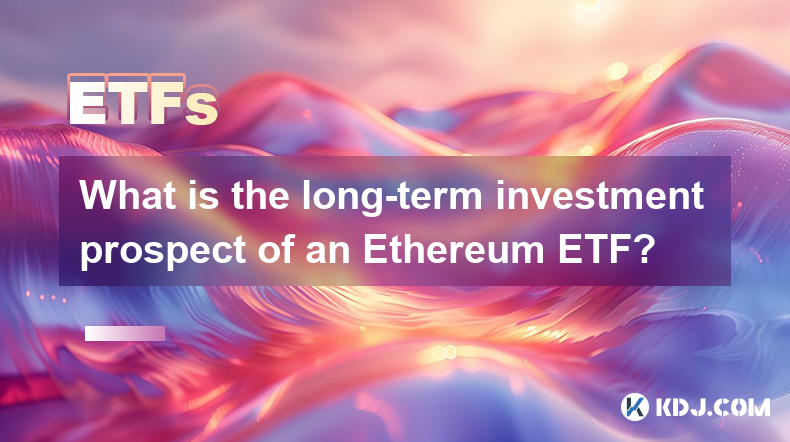
What is the long-term investment prospect of an Ethereum ETF?
Mar 18,2025 at 03:01pm
Key Points:Uncertainty surrounds the long-term prospects of an Ethereum ETF due to regulatory hurdles and market volatility.Approval hinges on regulatory clarity regarding cryptocurrencies, especially concerning investor protection and market manipulation.Successful ETF launches could boost Ethereum's price and adoption, but failure could negatively imp...
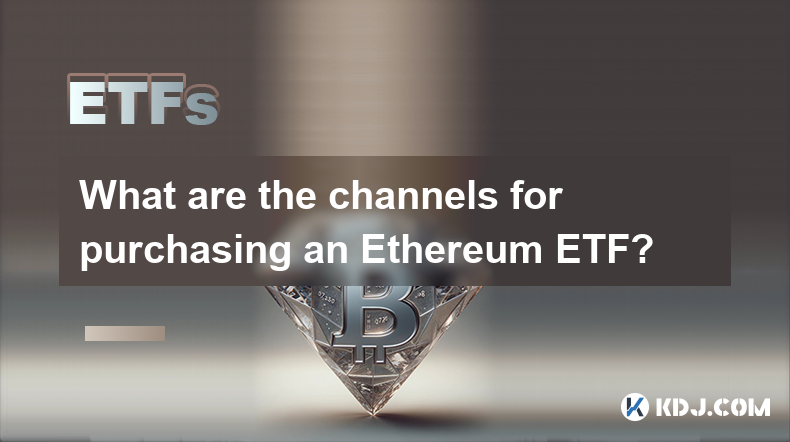
What are the channels for purchasing an Ethereum ETF?
Mar 18,2025 at 01:49am
Key Points:Currently, there are no Ethereum ETFs available for direct purchase by the general public in most major markets.Access to Ethereum exposure through ETFs is limited, mainly through futures-based ETFs.Purchasing Ethereum directly or through other investment vehicles remains a viable alternative.Regulatory hurdles and market complexities signifi...
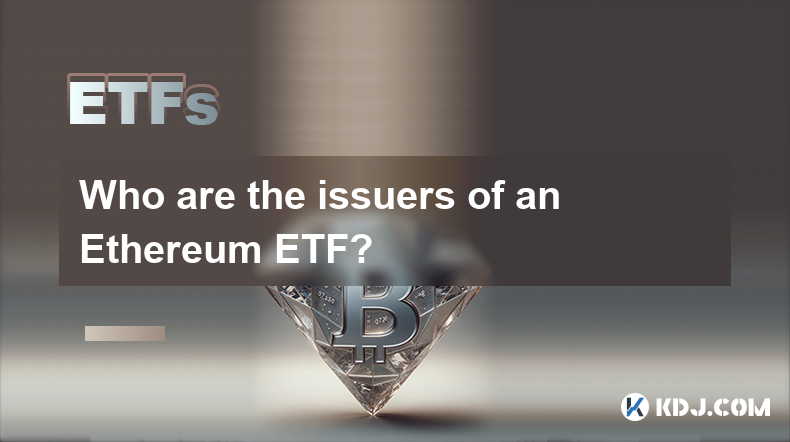
Who are the issuers of an Ethereum ETF?
Mar 19,2025 at 08:07pm
Key Points:There are no currently approved Ethereum ETFs in the US, meaning no single issuer can be definitively named. However, several firms have filed applications.The issuers of potential Ethereum ETFs will be large, established financial institutions, typically asset management companies.The specific requirements for ETF issuers are stringent and o...
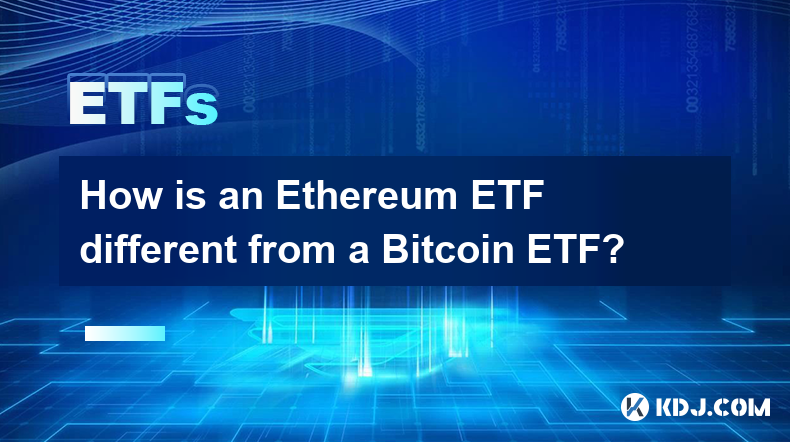
How is an Ethereum ETF different from a Bitcoin ETF?
Mar 17,2025 at 10:55am
Key Points:Underlying Asset: The core difference lies in the underlying asset: an Ethereum ETF tracks the price of Ether (ETH), while a Bitcoin ETF tracks the price of Bitcoin (BTC).Technology and Use Cases: Ethereum's blockchain supports smart contracts and decentralized applications (dApps), creating a distinct technological and investment narrative c...
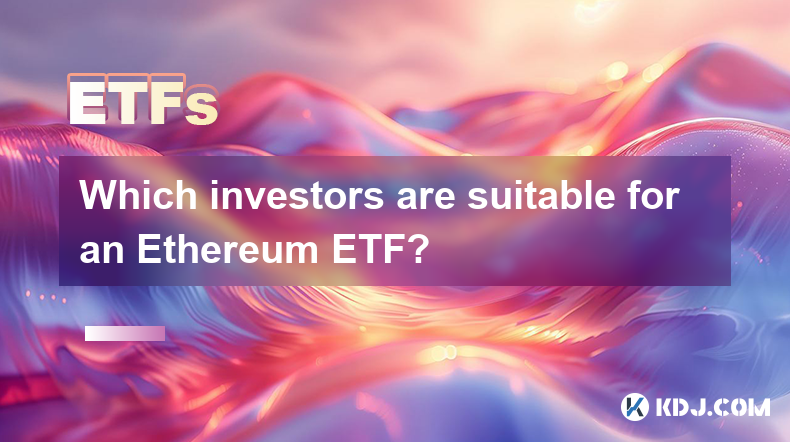
Which investors are suitable for an Ethereum ETF?
Mar 16,2025 at 05:50pm
Key Points:Risk Tolerance: Ethereum ETF investment requires a high risk tolerance due to the volatility of the cryptocurrency market.Investment Goals: Investors seeking long-term growth potential and exposure to the Ethereum ecosystem are suitable candidates.Investment Horizon: A longer-term investment horizon is crucial to weather market fluctuations.U...
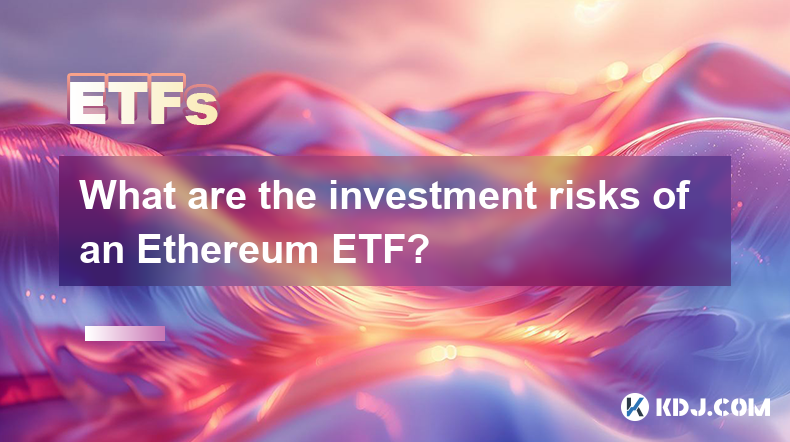
What are the investment risks of an Ethereum ETF?
Mar 18,2025 at 02:12am
Key Points:Price Volatility: Ethereum's price is highly volatile, impacting ETF share prices.Regulatory Uncertainty: Changes in regulatory landscapes can significantly affect ETF trading and performance.Market Manipulation: The potential for market manipulation, particularly in smaller ETFs, exists.Underlying Asset Risk: Risks associated with the Ethere...

What is the long-term investment prospect of an Ethereum ETF?
Mar 18,2025 at 03:01pm
Key Points:Uncertainty surrounds the long-term prospects of an Ethereum ETF due to regulatory hurdles and market volatility.Approval hinges on regulatory clarity regarding cryptocurrencies, especially concerning investor protection and market manipulation.Successful ETF launches could boost Ethereum's price and adoption, but failure could negatively imp...

What are the channels for purchasing an Ethereum ETF?
Mar 18,2025 at 01:49am
Key Points:Currently, there are no Ethereum ETFs available for direct purchase by the general public in most major markets.Access to Ethereum exposure through ETFs is limited, mainly through futures-based ETFs.Purchasing Ethereum directly or through other investment vehicles remains a viable alternative.Regulatory hurdles and market complexities signifi...

Who are the issuers of an Ethereum ETF?
Mar 19,2025 at 08:07pm
Key Points:There are no currently approved Ethereum ETFs in the US, meaning no single issuer can be definitively named. However, several firms have filed applications.The issuers of potential Ethereum ETFs will be large, established financial institutions, typically asset management companies.The specific requirements for ETF issuers are stringent and o...

How is an Ethereum ETF different from a Bitcoin ETF?
Mar 17,2025 at 10:55am
Key Points:Underlying Asset: The core difference lies in the underlying asset: an Ethereum ETF tracks the price of Ether (ETH), while a Bitcoin ETF tracks the price of Bitcoin (BTC).Technology and Use Cases: Ethereum's blockchain supports smart contracts and decentralized applications (dApps), creating a distinct technological and investment narrative c...

Which investors are suitable for an Ethereum ETF?
Mar 16,2025 at 05:50pm
Key Points:Risk Tolerance: Ethereum ETF investment requires a high risk tolerance due to the volatility of the cryptocurrency market.Investment Goals: Investors seeking long-term growth potential and exposure to the Ethereum ecosystem are suitable candidates.Investment Horizon: A longer-term investment horizon is crucial to weather market fluctuations.U...

What are the investment risks of an Ethereum ETF?
Mar 18,2025 at 02:12am
Key Points:Price Volatility: Ethereum's price is highly volatile, impacting ETF share prices.Regulatory Uncertainty: Changes in regulatory landscapes can significantly affect ETF trading and performance.Market Manipulation: The potential for market manipulation, particularly in smaller ETFs, exists.Underlying Asset Risk: Risks associated with the Ethere...
See all articles






















































































